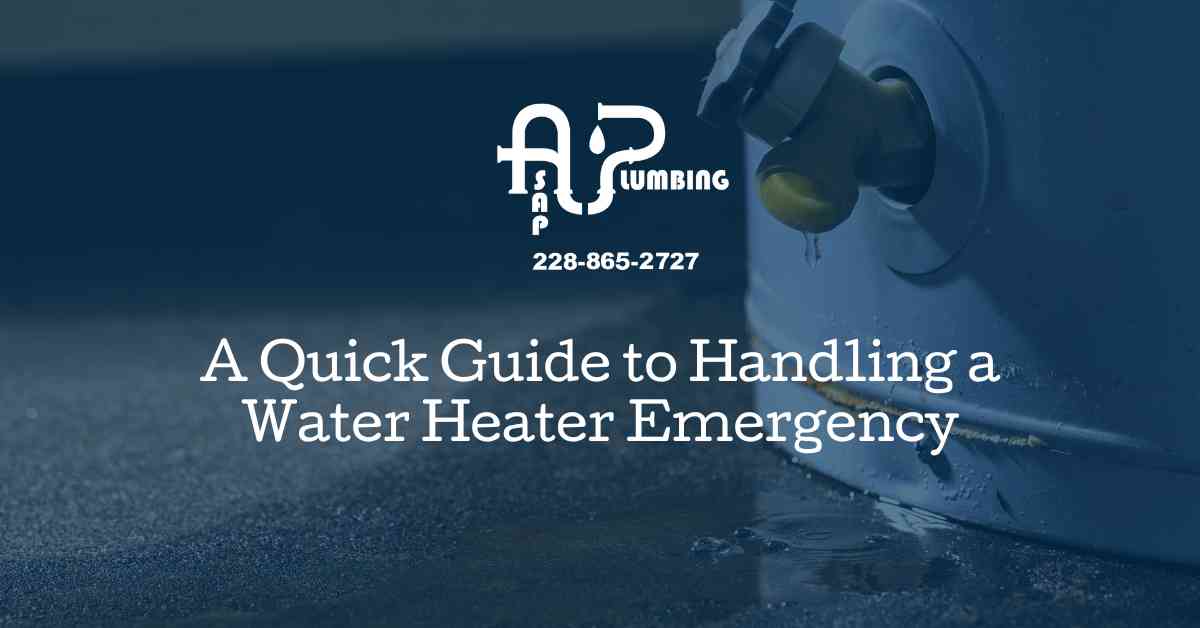Water heaters are indispensable in our homes, providing hot water for showers, cooking, cleaning and other daily needs. However, like all appliances, they can sometimes malfunction or cause emergencies that need immediate attention. At ASAP Plumbing, we understand how to handle water heater hazards in an emergency situation and can help prevent serious damage, injury and costly repairs. In this guide, we’ll cover some of the most common water heater emergencies and what you can do to handle them safely before professional help arrives.
Water Heater Leak or Flooding
One of the most common water heater emergencies is a leak. Whether it’s a small drip or a large pool of water, a leaking water heater can cause significant damage to your home if not addressed immediately.
What to Do:
- Shut off the water supply: Locate the shut-off valve on your water heater and turn it off to stop the flow of water.
- Turn off the power: If you have an electric water heater, switch off the power at the breaker panel. If it’s a gas water heater, turn off the gas supply.
- Contain the water: Use towels, a mop or a wet vacuum to soak up the water. If the leak is severe, catch as much water as possible.
- Call a plumber: Call a professional plumber immediately to prevent further damage.
Electric Shock or Electrical Hazard
Electric water heaters pose electrical hazards, especially if there’s a malfunction such as sparking or overheating. If you notice any unusual smells, sparks or burning odors, there could be a serious electrical issue.
What to Do:
- Turn off the power: Go to your electrical panel and switch off the power to the water heater to prevent electrical shock.
- Avoid water: Do not attempt to touch any electrical components or wiring if water is present. Water and electricity are a dangerous combination.
- Call a professional: Contact a licensed electrician or plumber to inspect the water heater and repair any electrical issues.
Water Heater Tank Pressure Build-Up
If there is too much pressure inside the water heater, it can lead to leaks or even explosions. This is especially concerning if the Temperature and Pressure Relief (T&P) valve is not working correctly.
What to Do:
- Turn off the power and water supply: Shut off both the power and water supply to the water heater.
- Release pressure: If you feel comfortable, open the T&P valve slightly to release some of the pressure. Be cautious as hot water may be expelled.
- Call a plumber: If you are unable to release pressure or suspect there is a major issue with the T&P valve, contact a plumber immediately to inspect and repair the system.
Excessive Noise from the Water Heater
If your water heater is making loud popping or rumbling noises, it’s likely caused by sediment buildup inside the tank. This is a sign of potential trouble and can lead to overheating and tank failure if not addressed.
What to Do:
- Turn off the power and water supply: Immediately shut off both the power and water supply to prevent further damage.
- Flush the tank: If you feel comfortable doing so, flush the tank to remove sediment buildup. If not, call a professional plumber to handle it.
- Get it inspected: Schedule regular maintenance to prevent future sediment buildup and ensure the tank is operating efficiently.
Gas Leak from a Gas Water Heater
A gas leak is one of the most dangerous water heater emergencies. If you smell gas near the water heater, it could be a sign of a leak, which can lead to an explosion or carbon monoxide poisoning if not addressed quickly.
What to Do:
- Turn off the gas supply: Immediately turn off the gas supply to the water heater by turning the gas valve to the off position.
- Evacuate the area: Open windows and doors to ventilate the area, but do not use any electrical appliances or switches, as they could ignite the gas.
- Do not attempt repairs: Do not try to repair the gas leak yourself. Evacuate your home and contact a professional plumber or gas company to address the issue.
Carbon Monoxide Poisoning from a Gas Water Heater
Carbon monoxide (CO) is a dangerous by-product of gas-powered appliances. If your water heater is not venting properly or there is a malfunction, it could lead to carbon monoxide poisoning, which is life-threatening.
What to Do:
- Turn off the gas supply: Shut off the gas supply to the water heater immediately.
- Ventilate the area: Open windows and doors to allow fresh air into the area.
- Leave the house: If you experience any symptoms of CO poisoning (headache, dizziness, nausea), leave the house immediately and seek fresh air.
- Call for professional help: Have a professional plumber inspect your gas water heater to ensure it is venting properly.
Failure of a Gas Water Heater’s Pilot Light
If you have a gas water heater, a failure of the pilot light can disrupt hot water supply and signal a more serious problem.
What to Do:
- Follow manufacturer instructions: Each model of water heater will have a specific process for safely relighting the pilot light. Follow the instructions carefully.
- Check for gas leaks: Before attempting to relight the pilot light, ensure there are no gas leaks. If you smell gas, do not attempt to relight it and call a professional immediately.
- Call a plumber: If the pilot light keeps going out, or you are unsure how to proceed, call a plumber to inspect the heater.
Water heater emergencies can be overwhelming, but knowing how to react quickly and safely can minimize damage and prevent injury. In any situation where you’re unsure, it’s always best to call a professional to inspect and repair the issue. Regular maintenance and inspection of your water heater can help prevent many of these emergencies from occurring in the first place. Always prioritize safety, and contact ASAP Plumbing for your water heater needs.

